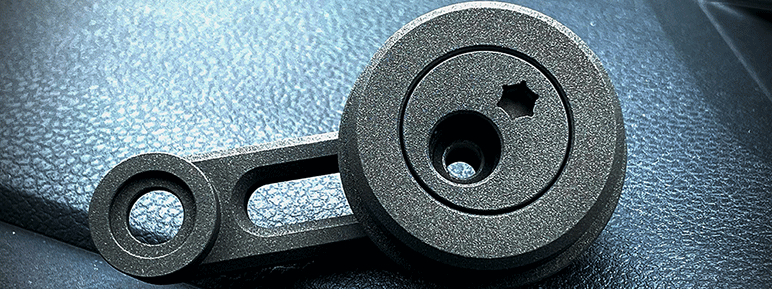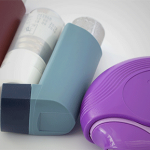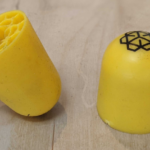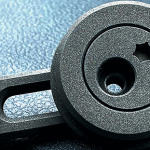- Home
- CNC Machining
- Finishing options for CNC machined prototype parts
Finishing options for CNC machined prototype parts
What are the finishing options for CNC machined prototype parts?
CNC milling and turning are versatile, cost-effective and accurate, yet the possibilities for CNC machined parts expand even further when additional finishes are considered. What are the options? While that sounds like a simple question, the answer is complex because there are so many factors to consider.
First, what is the finish for? Is it to improve aesthetics or performance? If the latter, what aspects of performance need to be improved? Corrosion resistance, surface hardness, wear resistance or EMI/RFI shielding? These are just some of the questions to be answered so, assuming the designer knows what the goals are, let us take a look at various options.

Finishes for CNC machined metal and alloy prototype parts
Over the last 40 years, Prototype Projects’ machinists have been asked to produce parts from a vast array of metals and alloys for applications in an even wider range of industries. CNC machined parts are routinely deburred, cleaned and degreased but, after that, the choice of additional finishes is very broad.
Today, our customers’ most popular metals are aluminium alloy 6082, stainless steel 304 and stainless steel 316. In fact, these three are so frequently requested that we hold stocks of them in various sizes to meet the needs of our three-day Express CNC machining service.
Still popular but specified less often are copper, brass, phosphor bronze, mild steel, tool steel. From time to time, customers also request CNC machining in numerous other metals and alloys. If we can source the material and machine it in-house, we will do so, otherwise we usually subcontract the work to a specialist selected from our network of trusted machine shops. For example, exotic alloys like Inconel, Monel and Hastelloy tend to require particular techniques and tooling, so we usually outsource this.
Metals and alloys can be finished in many different ways. For example, aluminium can generally be clear anodised, hardcoat anodised, or black or colour anodised, though 6082 aluminium alloy accepts anodising less well than some other grades. Likewise, the 5083 tooling plate we use can produce speckled marks. The choice depends on whether the requirement is to enhance the aesthetics or the performance (particularly corrosion resistance or wear resistance).
Stainless steel is inherently corrosion resistant but sometimes customers specify additional finishes. If surface hardness, wear resistance or fatigue performance need to be improved, both 304 and 316 stainless steel can be nitrided or nitrocarburised.
Mild steel benefits from perhaps the broadest choice of finishes. Options include wet painting, electrophoretic painting, powder coating, electroplating, chemical blacking, bead blasting, case hardening, titanium nitriding (TiN) coating, nitriding and nitrocarburising.
Copper and brass are usually specified for functional parts, with no further finishing required after machining. If necessary, however, parts can be polished manually, electroplated, vapour blasted, lacquered or treated with chemical blacking.
The finishes outlined above are not the only ones available for metal and alloys. We are always happy to discuss finishes with customers and we endeavour to help wherever we can.
Finishes for CNC machined plastic prototype parts
As with metal and alloy parts, all of the plastic parts we CNC machine are deburred, cleaned and degreased but, after that, the finishing options tend to be different.
As the majority of customers request CNC machined prototype plastic parts in either acetal (black or natural) or acrylic, we hold these in stock for our Express CNC machining service. Acetal does not readily accept additional finishes, so parts are normally supplied ‘as machined’. Acrylic, being clear, is often polished to give a glass-like appearance. This can be done manually with successively finer grades of abrasive, or with flame polishing. If required, acrylic can be painted with acrylic paint or vacuum metallised to achieve a highly reflective surface.
Beyond acetal and acrylic, we CNC machine prototype parts from an extensive range of engineering plastics. Some of these are easier to finish than others, so you are always welcome to discuss materials and finishes with us before requesting a quote. Depending on the plastic, we can sand, prime and paint parts, polish them (manually or by flame), electroless plate or vacuum metallise. For some plastics with low surface energy, specialist surface preparation with primer or plasma treatment is necessary.
Dimensional inspection of CNC machined prototype parts
One reason why customers choose to have prototype parts CNC machined rather than 3D printed is the higher accuracy. Our quoted tolerance for CNC machined parts is ±0.1mm, though dimensions are normally held to much tighter tolerances, depending on the material and geometry. We always check representative dimensions after machining, and customers can also ask for specific features to be checked as well.
Often the measurements can be taken with handheld callipers or micrometers but our co-ordinate measuring machine (CMM) is ideal for more thorough inspections. This takes time and is not available with our Express CNC service but it is quicker than sending the parts to a third-party for CMM inspection. The only exceptions are when a comprehensive, fully-programmed CMM inspection routine is required, or a batch of parts has been machined and 100 per cent inspection is required.
Assembly options for CNC machined prototype parts
‘Assembly’ here means anything from inserting Helicoils into aluminium alloy parts or threaded inserts into plastic parts, through to installing bearings and applying printed labels. Often we are asked to combine CNC machined parts with other prototype parts, whether they have been CNC machined, 3D printed or vacuum cast.
In fact, we will undertake almost any level of assembly of functional prototypes or visual models, incorporating prototype parts or standard off-the-shelf componentry as necessary. Another option is to overmould CNC machined parts with polyurethane by vacuum casting.
Whatever your prototype assembly requirements, we will work with you to meet your technical requirements and deadlines.
Please note, we do not offer some of the finishing options mentioned in this article in-house, but we can outsource on your behalf. Please discuss your specific needs with our office team so they can quote your part accordingly.
Talk to us
If you need CNC machined prototype parts, talk to us on 01763 249760 about the options for finishing, inspection and assembly.





